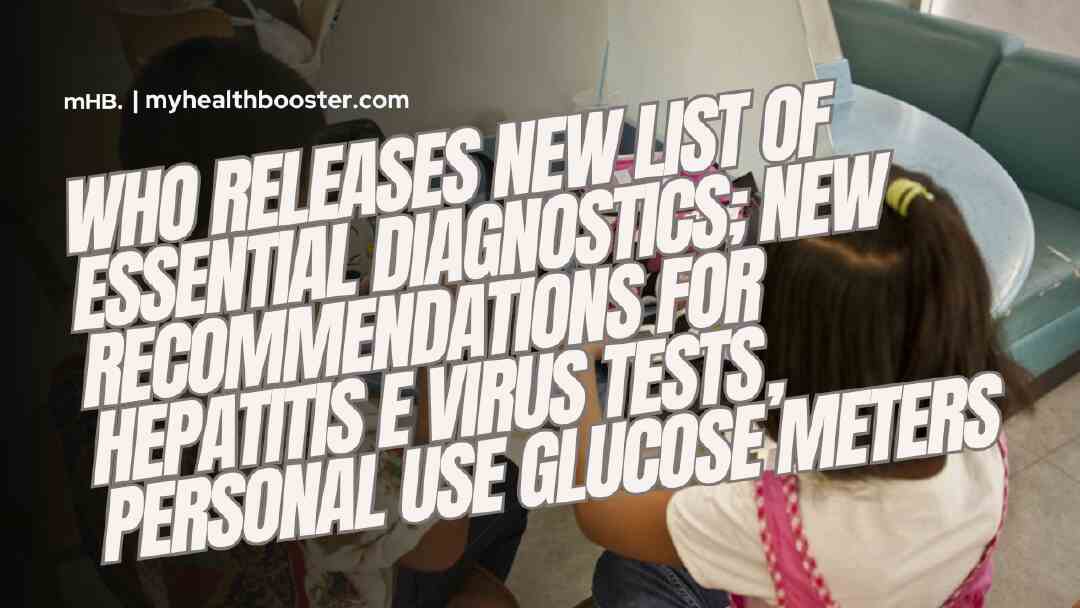The World Health Organization (WHO) has introduced its latest Essential Diagnostics List (EDL) for 2023, offering a meticulously curated compilation of evidence-based in vitro diagnostics (IVD) to guide national diagnostic choices.
This year’s list presents two noteworthy additions:
- Hepatitis E Virus (HEV) Tests: Three tests for HEV, including a rapid diagnostic tool, have been incorporated to facilitate HEV infection diagnosis and surveillance. Hepatitis E, while prevalent as outbreaks and sporadic cases worldwide, can result in acute liver failure in a small percentage (up to 4%) of patients, with even higher mortality rates (19.3-63.6%) in pregnant women. These new diagnostics aim to assist governments in effectively managing outbreaks.
- Personal Use Glucose Monitoring Devices: The list now advises including personal glucose monitoring devices alongside existing medical recommendations for diabetes. Diabetes is a chronic condition that contributed to 1.5 million deaths in 2019, with a more substantial impact on lower-middle-income countries. Improved disease management and reduced adverse outcomes can be achieved through these personal glucose testing devices.
The Essential Diagnostics List, while not prescriptive, serves as a valuable resource to aid countries in enhancing access to IVDs by providing a policy framework that supports informed decision-making regarding national Essential Diagnostics Lists. The ultimate goal is for governments to utilize this list to enhance IVD testing services, leading to greater diagnostic access and improved patient outcomes.
Dr. Tedros Adhanom Ghebreyesus, WHO Director-General, emphasized the crucial role of diagnostics in responding to health crises, citing their instrumental role during the early stages of the COVID-19 pandemic. The WHO Essential Diagnostics List provides countries with evidence-based recommendations for ensuring essential and reliable diagnostics are readily available to healthcare workers and patients.
For the 2023 Essential Diagnostics List, the WHO Strategic Advisory Group of Experts on in vitro diagnostics (SAGE IVD) conducted an extensive review of 12 applications and recommended the addition of eight IVDs, along with various edits to previously listed EDL tests. These adjustments include enhancements to diagnostics for tuberculosis, HIV, and diabetes mellitus.
Additional tests included in the 2023 list encompass various medical domains:
- Endocrine Disorders: Two new tests were introduced, including a laboratory-based test for parathyroid hormone, facilitating the evaluation of calcium homeostasis disorders and treatment monitoring, and a laboratory-based test for 17-Hydroxyprogesterone, aiding in the diagnosis and monitoring of congenital adrenal hyperplasia outside of the neonatal period.
- Reproductive, Maternal, and Newborn Health: The inclusion of two tests, the Kleihauer-Betke acid-elution test for diagnosing and treating fetomaternal hemorrhage, and a point-of-care test to determine blood groups and Rhesus factor in the context of maternal healthcare and hemolytic disease of the fetus and newborn.
- Cardiovascular Health: The list welcomes high-sensitivity troponin I and T, designed to facilitate acute myocardial infarction diagnosis in healthcare facilities with clinical laboratories.
With the recent adoption of WHA 76.5, emphasizing the strengthening of diagnostics capacity, Member States are strongly encouraged to incorporate national diagnostic strategies into their health plans. They are also urged to consider developing national essential diagnostics lists based on the WHO model list of essential in vitro diagnostics. The WHO actively supports numerous countries worldwide in their efforts to establish EDLs through various means, including webinars, workshops, and direct country assistance.
Updated biennially, the Essential Diagnostics List is designed to bolster national in vitro diagnostics policy development and improve access to IVD testing and clinical laboratory services. In addition to guiding national EDLs, it offers recommendations for IVD prioritization across different healthcare system levels. Furthermore, it provides insights to United Nations agencies and non-governmental organizations involved in IVD selection, procurement, supply, or donation. It also offers guidance to the private health technology and manufacturing sectors regarding IVD priorities required to address global health challenges.
For comprehensive details on the 2023 WHO EDL and its associated decisions, follow the link.
